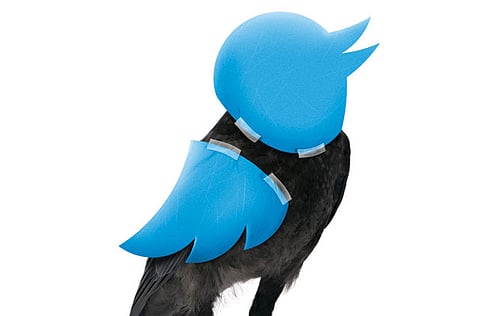Twittergate debacle triggers ethical debate
Obama-Romney scandal has shed light on a thriving market in bogus popularity

In the run-up to the US presidential elections, a new app which unmasks fake Twitter followers has embarrassed both candidates. For the first time, the ethics of social networking has become an election issue.
The ‘Twittergate’ scandal first erupted in late August when the Republicans’ choice, Mitt Romney, suddenly acquired more than 100,000 followers over one weekend, prompting accusations from Barack Obama’s team that he had gone out and bought himself a ‘small city’s worth’ of phoney acolytes.
It turns out that there is a thriving market in bogus popularity and a sliding scale of deceit. At the very bottom are the ‘bot’ followers — fake accounts generated remotely by computer robots and represented by the generic, so-called ‘egg-plate’ avatar. You can buy 50,000 of these for $49.99 at www.greatestsale.com.
At the top end of the market, 100,000 ‘fully-profiled, real’ followers — i.e. accounts that have a picture of a real individual and have processed at least one tweet — will cost you $1,500 at www.bodylanguage101.com.
For a whopping £60,300 a year, www.brandboost.co.uk will manage your entire social networking presence, ‘populating’ your Twitter account and ‘seeding friends’ on Facebook. The arrival of Status Group’s ‘Fake Follower Check’ on the social networking platform threatens to bankrupt these purveyors of illusion.
Fake followers
‘Fake Follower Check’ can distinguish between followers which are ‘definitely fake’, those that are ‘inactive’ (suggesting that they are not authentic) and those that are ‘good’.
Lady Gaga currently holds the record for the most Twitter followers with 29 million. ‘Fake Follower Check’ revealed that only 24 per cent were ‘good’. By way of comparison, Pope Benedict XVI has just 12,705 followers — all of them, trying at least, to be ‘good’.
US First Lady Michelle Obama recently assured the nation on prime time television that her husband is ‘the man you can trust’; reporters using Fake Follower Check were obliged to question that assertion having discovered that of Obama’s impressive 19-million-strong Twitter following 66 per cent were fake or inactive.
Does Twitter matter? French politician Segolene Royale certainly thinks so – she put her failure to win a seat in July’s parliamentary elections down to a tweet supporting her rival from Valerie Trierweiler, the woman who usurped her in the affections of President Francois Hollande.
US comedian Dan Naina told the New York Times that he had bought 150,000 fake followers to boost his ‘cachet’ in a world where promoters and potential bookers need to be assured of an act’s popularity.
It is not surprising that America’s presidential candidates wish to generate an illusion of devotion but is it ethical to do so by deceit?
Romney is of the Mormon faith in which ‘lying for the Lord’ to protect the image of the church is recommended.
Robert Millet, a leading Mormon figure, advised, “don’t answer the question they asked, answer the question they should have asked”.
Has Romney taken to ‘lying for the Republicans’? Fake Friend Finder found that only 45 per cent of his Twitter following was genuine.
Issue of morality
The moral high ground on the matter has already been seized by the ulemas of Saudi Arabia. At the end of August, Grand Mufti Shaikh Abdul Aziz Al Shaikh issued a fatwa forbidding fabricating Twitter followers.
Shaikh Abdul Aziz was compelled to describe Twitter as ‘a platform for trading accusations and for promoting lies’ in the aftermath of a scandal caused by a celebrated Saudi cleric being caught red-handed.
Known for his Salafist tweets in Arabic, which were unlikely to be of mass international appeal, he inflated his follower numbers to two million — a bubble that was easily burst by an astute fellow Saudi tweeter who pointed out that there are only 1.2 million registered Twitter users in the entire Arab world.
Twitter is increasingly popular. Even the Taliban, who banned televisions when they ruled Afghanistan, took to TwitterLong (which allows more than the 140 character limit of a normal tweet) to make their statement on the 11th anniversary of 9/11 this week. Everyone who wants to make an impact nowadays uses Twitter.
But Shaikh Abdul Aziz is right in his assessment that it lends itself to many forms of deception; and it is still relatively unregulated.
The business community has been quick to exploit loopholes in the ‘Twittersphere’. Competing brands indulge in ‘username squatting’, registering control of a rival’s twitter ‘handle’ so that the real owner cannot participate using their own brand name.
Reputation sabotage is another common abuse, whereby a rival or protestor registers as the target and then impersonates him or her, making unacceptable, abusive or controversial tweets in their name. In the UK, regional newspaper group Northcliffe, recently took legal action to unmask a person who was maliciously impersonating its chief executive.
To return to the imminent US elections, the Twittergate debacle has raised important questions. Should we worry that Obama and Romney, rivals for the role of most powerful man on the planet have been unmasked as digital fraudsters? How far can we trust a man with Fake Friends?
Twitter is clearly worried that its platform is so ethically insecure and recently established a ‘Trust and Safety’ team to ensure greater transparency. Presumably they have hired new personnel for the task — of CEO Dick Costolo’s 993,000 followers, 72 per cent are, apparently, fake or inactive.
Susan de Muth is a London-based journalist who focuses on the Middle East, contributing regularly to specialist publications.


